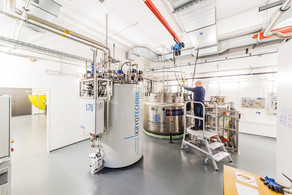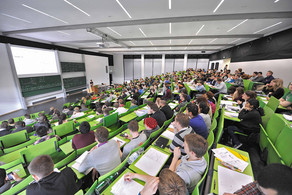Thesis defense of Florian Mentzel
- Defense
Microbeam radiation therapy (MRT) is a promising yet preclinical radiotherapy treatment for several tumour diagnosis such as gliosarcoma and radioresistant melanoma for which even modern clinical treatments such as intensity-modulated radiation therapy (IMRT) and volumetric modulated arc therapy (VMAT) yield poor outcome perspectives. The dose prediction during MRT treatment planning, as for most other novel radiotherapies, is mostly performed with very time-consuming Monte Carlo (MC) simulations. This slows down preclinical research processes and renders treatment plan optimization infeasible. In this thesis, several milestones for the introduction of a fast machine learning (ML) dose calculation method for MRT are presented. First, a 3D U-Net-based ML dose engine is developed using MC training data obtained with Geant4 simulations of a synchrotron broadbeam incident on different bone slab models and a simplified human head phantom as a proof of concept. The developed model is shown to produce dose predictions within less than 100 ms which is substantially faster than the used MC simulations with up to 20 hours and also the currently fastest approximative MRT dose prediction approach, called HybridDC, with approximately 30 minutes. The model is also shown to be superior to a dose prediction approach using generative adversarial networks (GANs) and also a novel transformer-based ML model called Dose Transformer (DoTA), with which it is compared for application in proton minibeam radiation therapy (pMBRT) in a subsequent study. Secondly, the developed ML model and the MC simulations for data generation are extended to account for the spatially fractionated nature of MRT. For this, a novel MC scoring method is developed which is able produce separate dose estimations for the high-dose peak regions where the microbeams traverse the phantoms and the low-dose valley regions in-between those beams. Finally, the developed ML model and the MC scoring method are deployed in a first application of an ML dose prediction method in a preclinical MRT study in collaboration with the University of Wollongong, Australia, conducted at the Imaging and Medical Beamline (IMBL) at the Australian Synchrotron which aimed at treating rats after implanting gliosarcoma cells. It is shown that the ML model can be trained to provide unbiased dose estimations in complex target phantoms even when trained on high-noise MC data, in important finding for the acceleration of future developments of ML models as such datasets can be produced significantly faster. The ML predictions in the rat phantoms deviate at most 10% from the MC simulations, rendering the proposed model a suitable candidate for fast dose predictions during treatment plan optimization in the future.









